I have been an advocate for scientific research, particularly cancer research, for more than 20 years. Thanks to ORAU, I have become a researcher.
I never saw that coming, and I say that considering I’ve had some remarkable experiences. As a research advocate I have
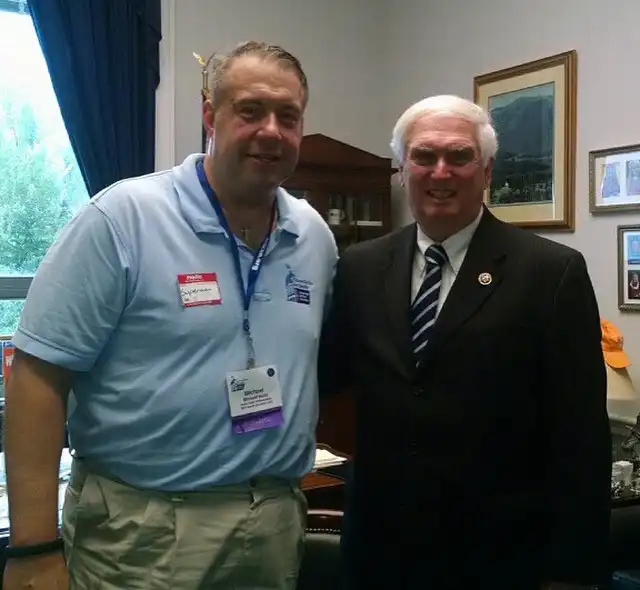
Meeting with former Congressman John J. “Jimmy” Duncan in his Washington, D.C., office
- Met with my congressman and senators dozens of times to urge them to support increases in federal research funding.
- Shared my lived experience as a cancer survivor in front of hundreds of Hill staffers at Congressional briefings and spoken at many local and national research events.
- Met and talked with researchers at federal agencies, academic institutions, and pharmaceutical and medical device companies.
- Attended international conferences where the latest innovations were presented.
- Served as an advocate reviewer on numerous peer review panels for the U.S. Department of Defense Congressionally Directed Medical Research Program, the National Cancer Institute, the Cancer Prevention and Research Institute of Texas, and the Prevent Cancer Foundation.
- Met and developed friendships with patients whose lives have been impacted by research. My best friend, Ryan, was one of those people. Sadly, he passed away from colorectal cancer last December.
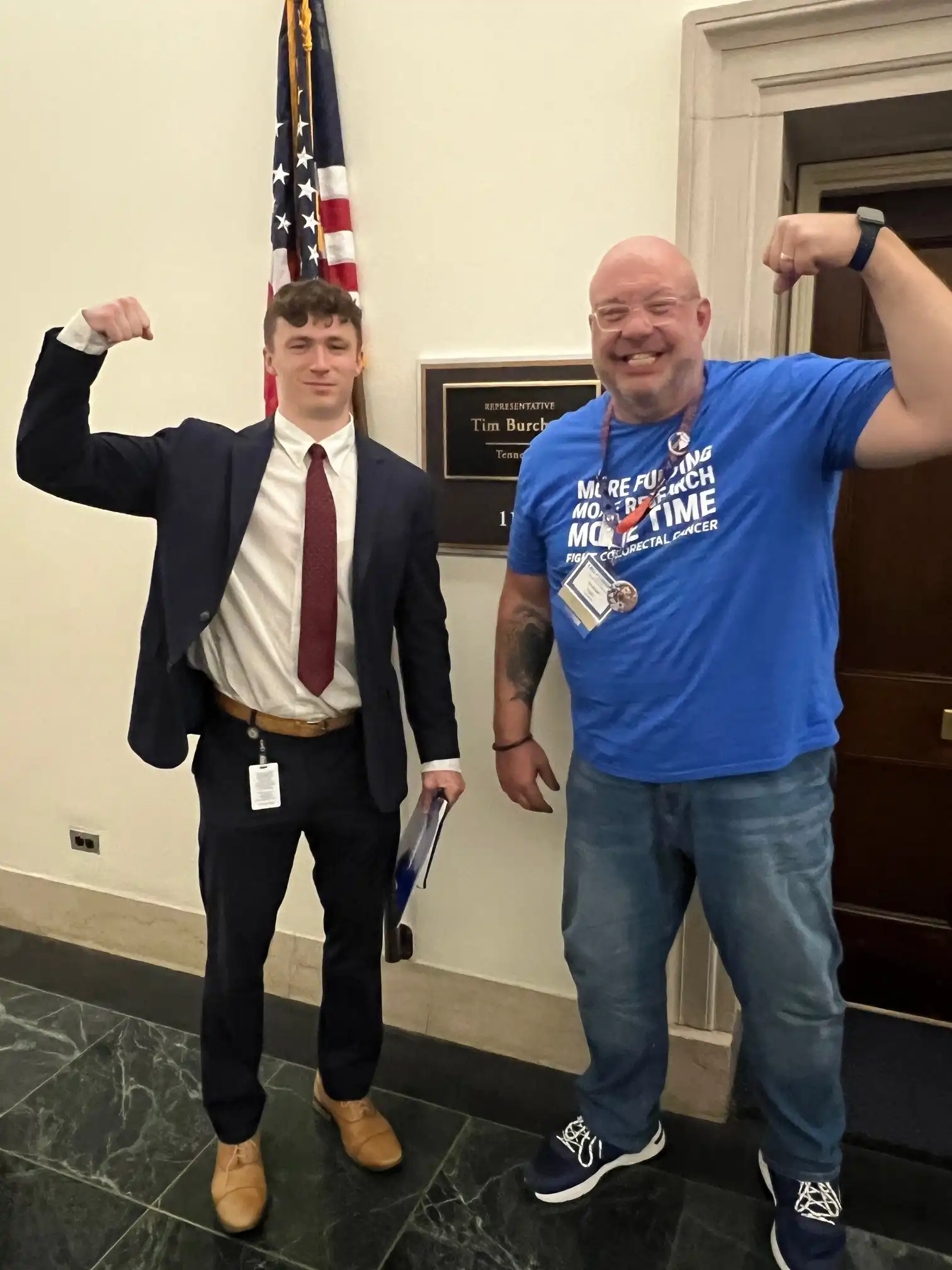
Outside Rep. Tim Burchett’s office after meeting with Taylor Holcomb from the congressman’s staff
My life was saved because of cancer research.
A clinical trial in the late 1990s and early 2000s known as the MOSAIC trial (Multicenter International Study of Oxaliplatin/5-Fluorouracil/Leucovorin in the Adjuvant Treatment of Colon Cancer), investigated the benefits of adding a platinum-based drug called oxaliplatin to the standard chemotherapy regimen of 5-fluorouracil (5-FU) and leucovorin for stage II or III colon cancer. The trial found that adding oxaliplatin significantly improved disease-free survival and overall survival in patients with stage II or III colon cancer.
This drug combination is commonly called FOLFOX and is the standard of treatment for many of us diagnosed with colorectal cancer. I was diagnosed with stage-IIIb rectal cancer in March 2012. My 11-month treatment regimen included 12 infusions of FOLFOX.
While FOLFOX is an effective treatment for colorectal cancer, the long-term side effects of oxaliplatin, a platinum-based drug, have not been adequately studied, and I hope to change that. More on that in a moment.
My treatment protocol also included 28 rounds of radiation aimed where the sun doesn’t shine.
When I came to work at ORAU in 2017, I learned that our history included running a cancer hospital, which was opened in 1950, under the company’s former Medical Division. The hospital was stood up by the Atomic Energy Commission (predecessor agency to the current U.S. Department of Energy) to research the use of radiation to treat cancer. Throughout its 24 years, the Medical Division team contributed pioneering research toward everything we know today about radiation therapy, nuclear medicine and immunology. All of this is documented in “ORAU From the Beginning,” the book about the early years of the company as told by Dr. William Pollard.
Because I was treated with radiation, I was fascinated by the medical hospital aspect of ORAU’s history, but it was something we hadn’t talked about publicly for a long time. I wanted to help change that and tell the broader story of ORAU’s capabilities in the cancer space over the years.
In 2023, I heard about the Thought Leadership Research Awards (TLRA) offered by ORAU’s Research and University Partnerships Office, which supports the development of papers for publication by peer-reviewed journals, as well as white papers and other research support activities.
I conceived an idea to write a paper that would capture the history of ORAU’s capabilities in the cancer space, from running the hospital to health communications and everything in between. Additionally, I wanted to lean into my cancer advocacy experience to identify potential government contracts and ORAU-Directed Research and Development (ODRD) projects that would fill some of the gaps in research. In one paper, I could talk about our history and my advocacy expertise, and the potential for new business would be icing on the cake!
I discussed my idea with Ken Tobin, then chief research and university partnerships officer, and Wanda Gamble, chief business development officer, both of whom encouraged me to pursue the TLRA.
I wrote and submitted an abstract describing my idea and, much to my delight, got the TLRA. RUPO would fund my time to research and write my white paper.
Before the TLRA, my last major research project was my master’s degree thesis, which I completed in 1998. That research was a requirement for my degree. My TLRA was and still is a passion project, and so much has happened since I wrote it.
“Meeting the Moment: Aligning ORAU’s capabilities with the federal government’s priorities to end cancer as we know it,” was completed in October 2023. In addition to a dive into ORAU’s history and capabilities in the cancer space, I made 11 total recommendations: four related to contracts the Business Development team could pursue pending the passage of specific pieces of federal legislation, none of which was enacted, and seven recommendations for ODRD projects.
Those recommendations are:
- Develop communications strategies for improving cancer screening rates among underserved populations, especially the black and LGBTQIA+ communities.
- Study and improve the processes for collecting patient-reported outcome measures between treatment visits.
- Identify best practices for communication to improve the uptake of low-dose CT for lung cancer screening.
- Study cancer-related stigma and the preference for or against using militaristic language (e.g. war on cancer, personal fight, etc.) to describe a patient’s cancer treatment experience.
- Study and recommend best practices for ensuring inclusion of the special needs of cancer patients in disaster preparedness guidelines.
- Study the benefits of peer-to-peer support to the mental health and quality of life of men diagnosed with cancer.
- Develop and test messaging to patients who may wish to request a blood test to screen for colorectal cancer rather than submit to a colonoscopy.
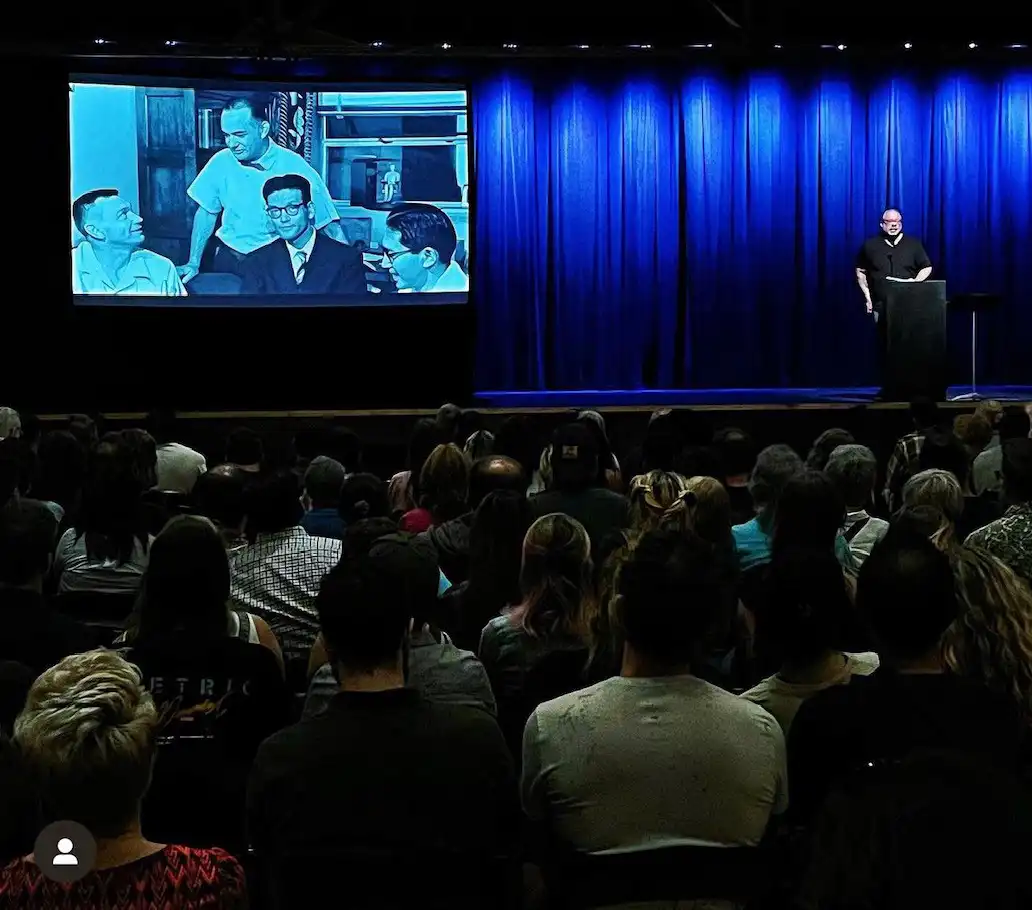
Presenting at PechaKucha Night in Knoxville, 2023.
In the year during which I wrote the paper, I shared elements of ORAU’s history at an event called PechaKucha Night in Knoxville, where I shared a fast-paced version on 20 slides for 20 seconds each. I also developed a poster for the ORAU Annual Meeting, where I talked about our capabilities and talked to researchers at some of our consortium member universities about potential areas of research. And I presented a poster at an annual Centers for Medicare and Medicaid Services conference in Washington, D.C., where I talked about some of my research recommendations.
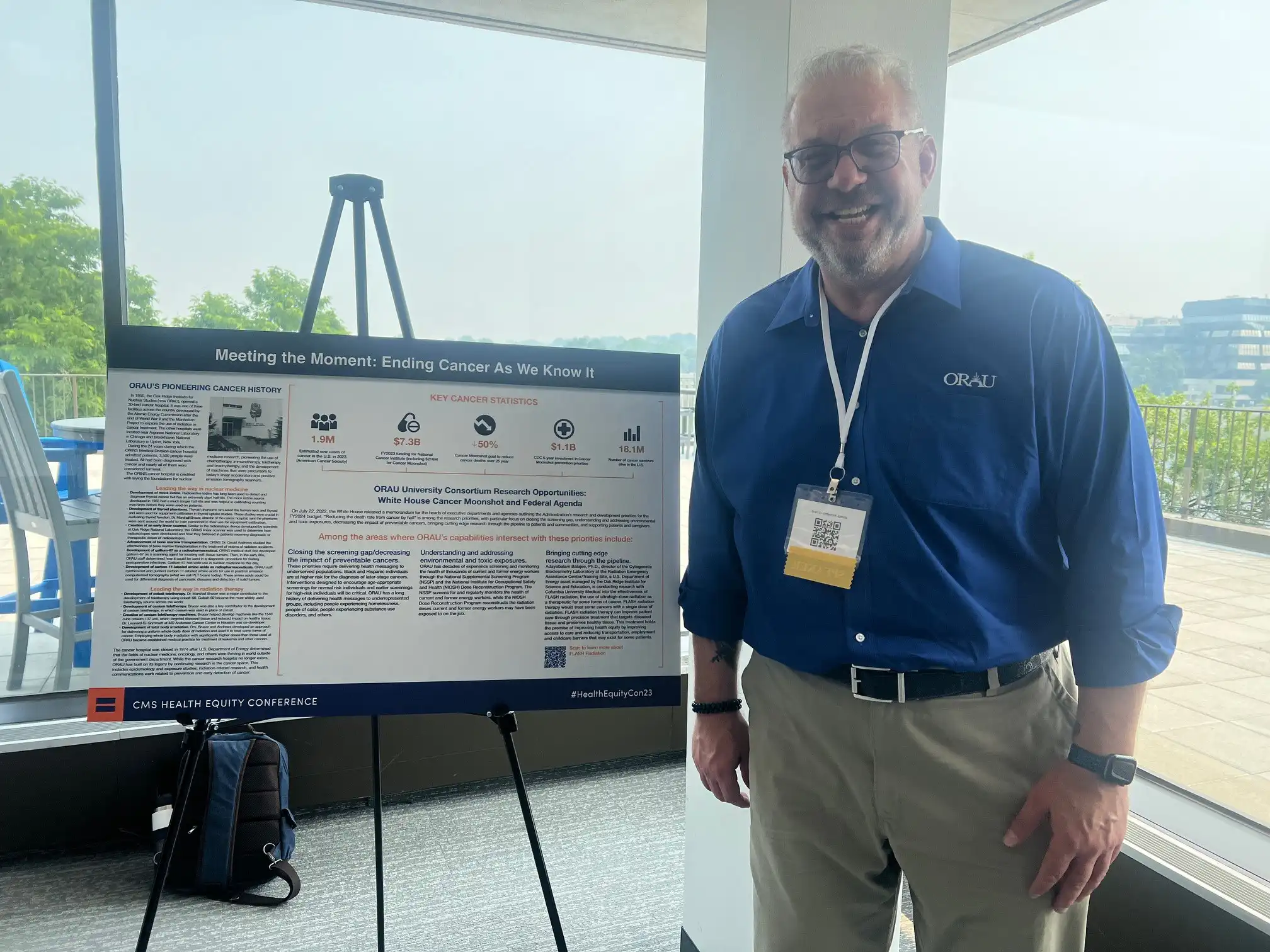
Presenting a poster at a Centers for Medicare and Medicaid Services conference in 2023.
To my delight, one of my ODRD recommendations has been funded. Katherine Chyka, health education specialist on ORAU’s Public Health and Healthcare team, is serving as the primary investigator on the project to study the benefits of peer-to-peer support for men facing cancer. She is working with Teresa Hagan Thomas, Ph.D., BA, RN, vice chair for research and scholarship at the University of Pittsburgh School of Nursing. The results of their research are due this fall.
In the meantime, I have become seriously enthusiastic about research. I joined Fight Colorectal Cancer’s Research Advocacy and Training Support Program (RATS), through which volunteers for the non-profit organization become empowered and trained to better understand research as it relates to colorectal cancer.
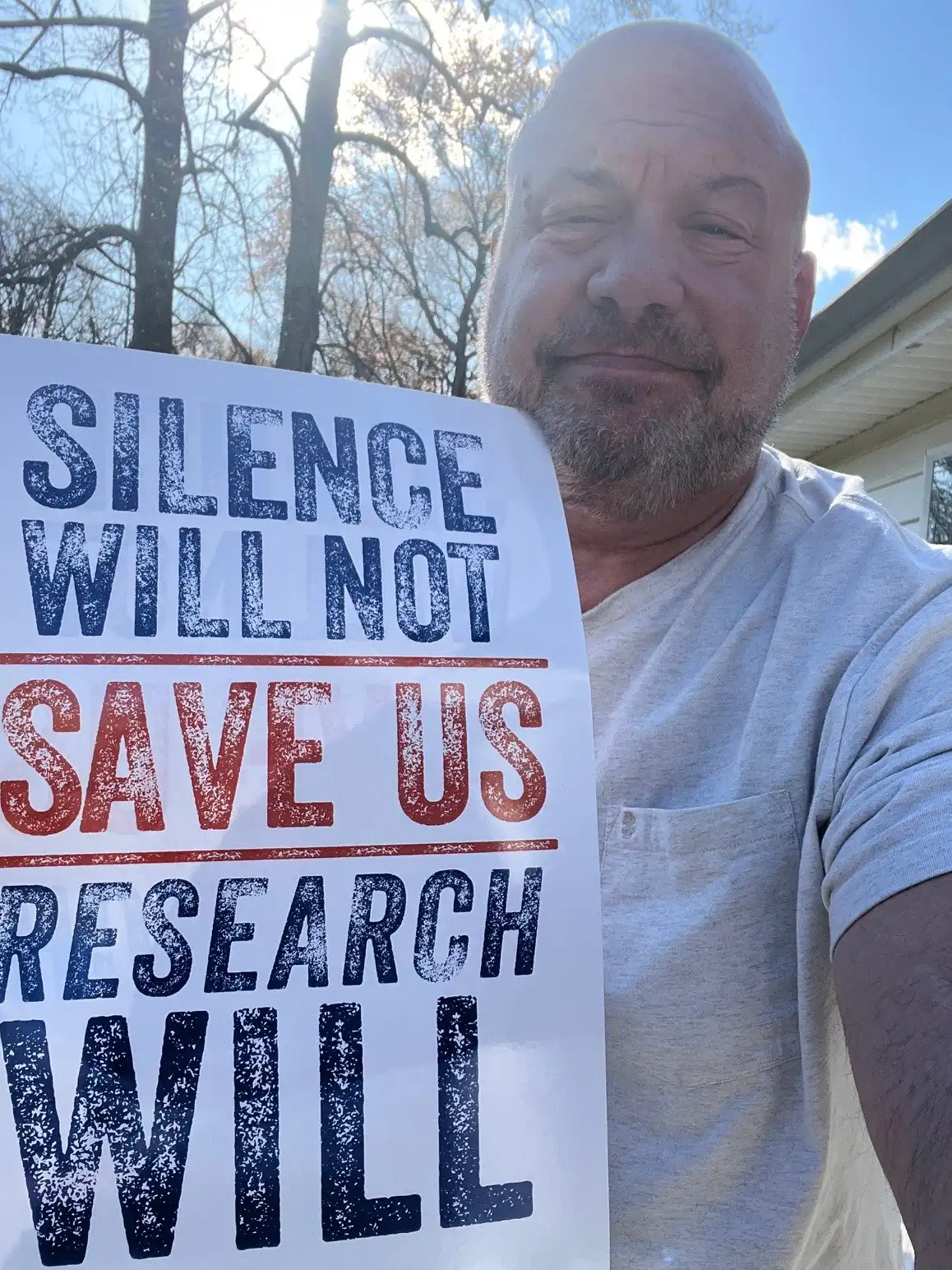
Selfie in support of research funding as a Fight Colorectal Cancer Research Advocacy Training and Support program volunteer.
Under the auspices of the RATS program, I applied and was accepted into the American Association for Cancer Research Scientist <-> Survivor Program (AACR SSP), which builds partnerships with scientists and survivor/advocates. The program takes place during the AACR annual meeting and is quite arduous. The application requires a poster abstract that, if accepted, must be completed before the conference begins and is presented during the annual meeting. During the meeting, SSP cohort members are placed into teams and are asked to answer a challenge question using all the information they learn during the annual meeting. Teams present on the last night of the SSP before a graduation ceremony is held.
I mentioned earlier that my treatment regimen for rectal cancer included oxaliplatin. My poster for the AACR SSP focused on the long-term side effects of oxaliplatin on patients treated for colorectal cancer. The challenge is there is no research on the long-term side effects. In my literature review, the one paper I found about long-term side effects considered two months post-treatment to be long term.
During my poster presentation, I heard from several researchers who had not treated patients and were unaware of the long-term side effects and wanted to know more, or who were interested in filling that research gap, eventually.
That same poster has been accepted by the Southeastern Colorectal Cancer Consortium, which is meeting in Savannah in late June, and I’ve submitted an abstract to the American Society for Clinical Oncology Quality Care Symposium, taking place in Chicago in October. Whether it gets accepted remains to be seen.
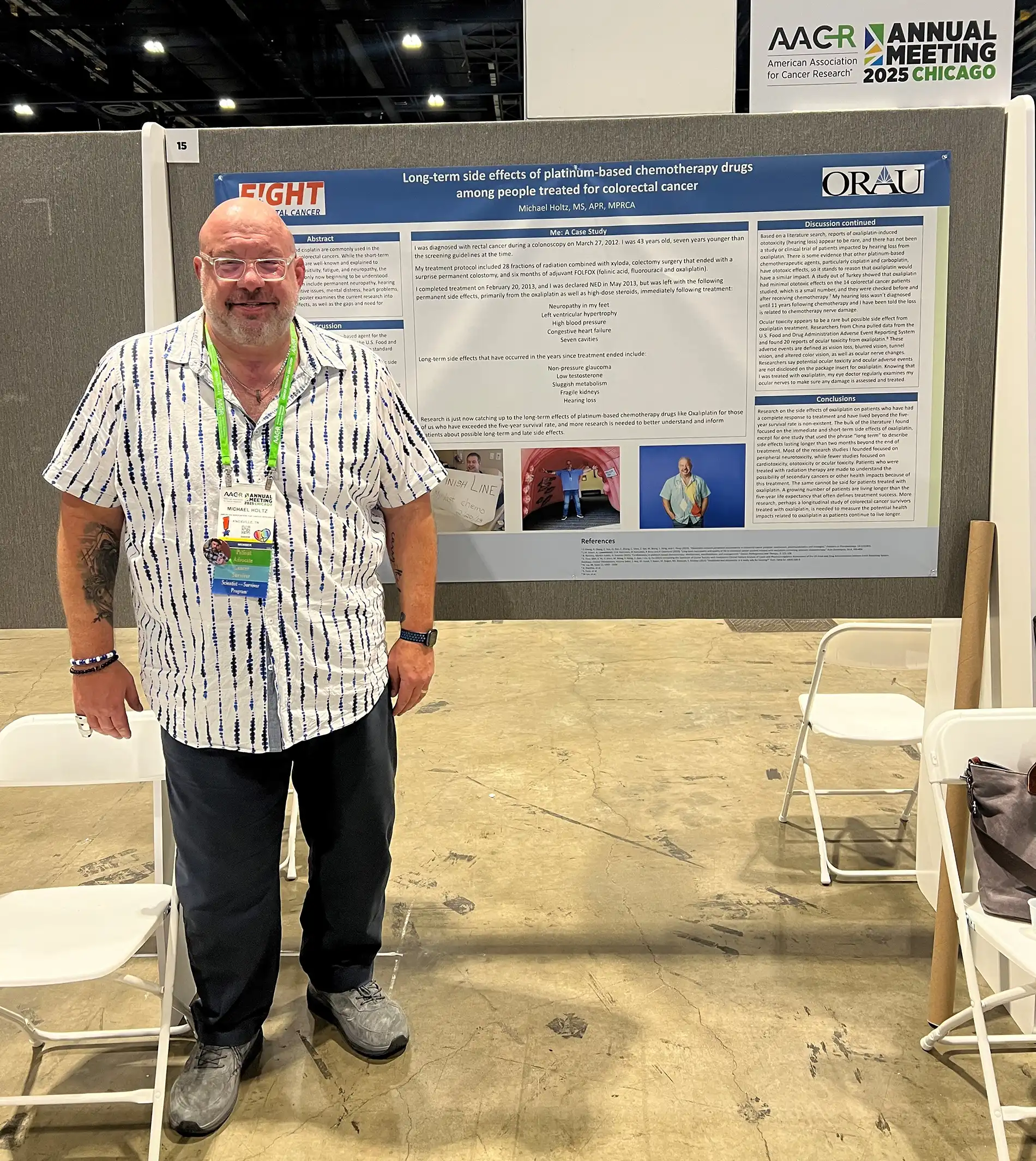
Poster presentation at the American Association for Cancer Research annual meeting in April 2025.
I share all of this to say: taking one small step in the direction of things you are passionate about can lead to another opportunity and to another path. Before long, you look back and see you’ve made incredible strides in impacting something of great importance to you, and possibly to others. I never thought I would see myself as I researcher. Thanks to ORAU and being given the latitude to pursue a personal interest, I can proudly say I am a researcher now, and this research will impact lives!